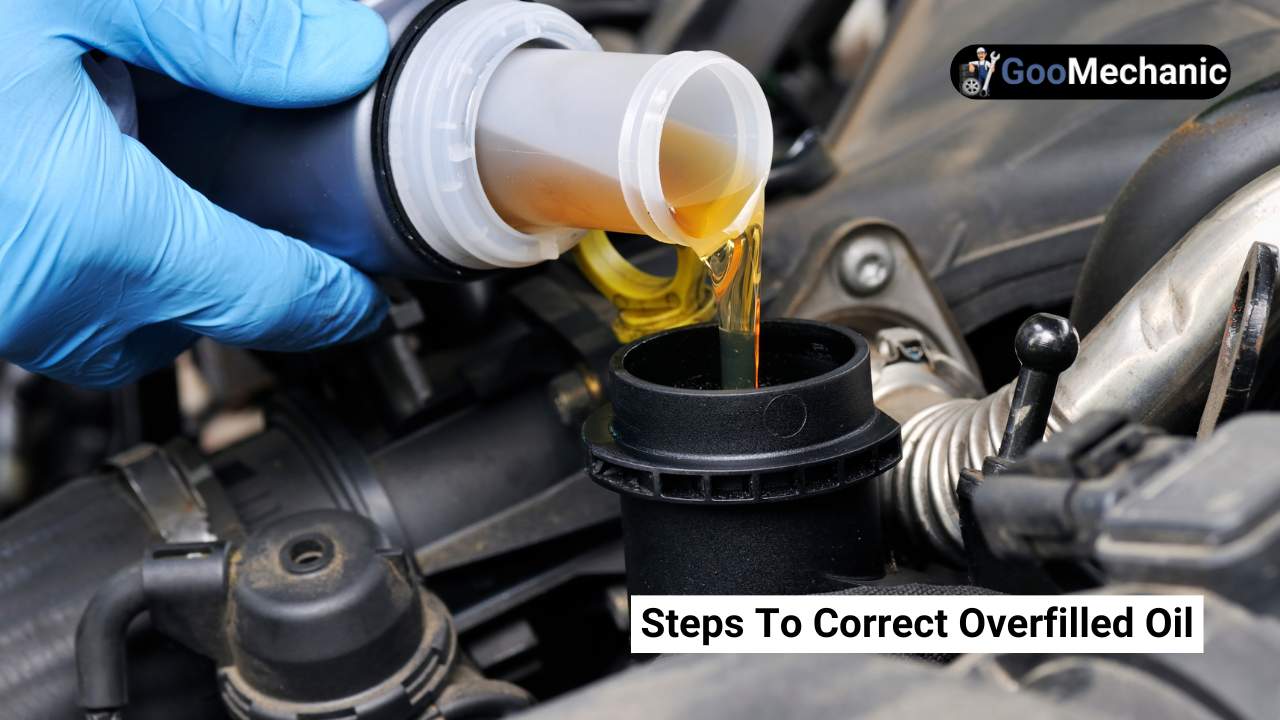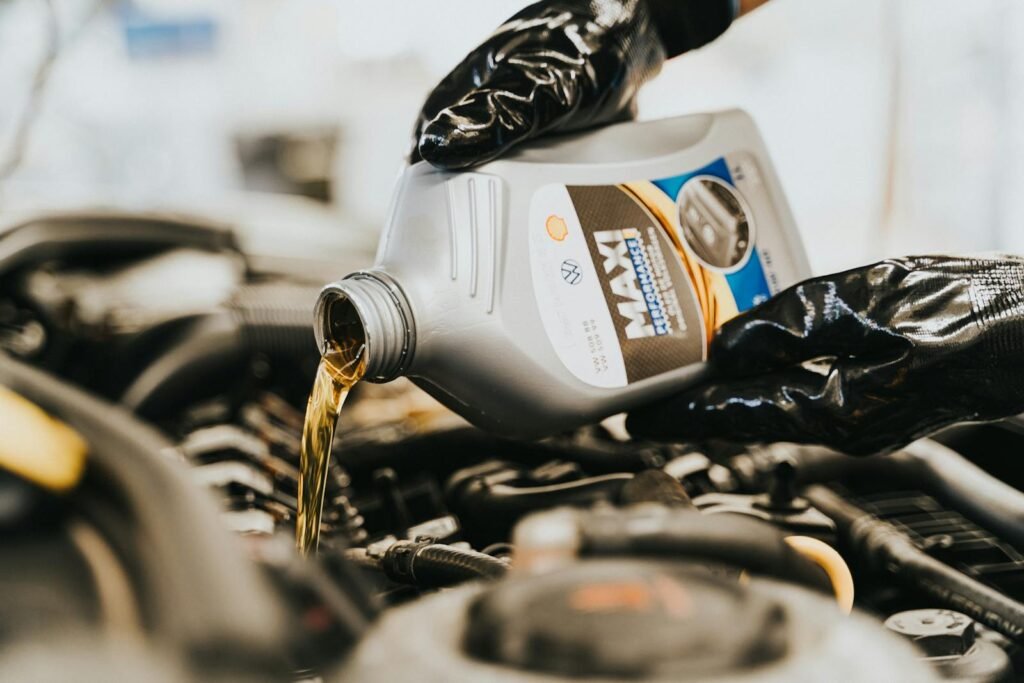Overfilling engine oil can cause serious damage to your vehicle’s engine. It leads to increased pressure and potential leaks.
Maintaining the correct engine oil level is crucial for optimal engine performance and longevity. Overfilling the engine oil can result in excessive pressure, which may damage seals and gaskets, leading to costly repairs. It can also cause the oil to foam, reducing its lubricating properties and increasing the risk of engine wear.
Regularly checking and maintaining the proper oil level ensures your engine runs smoothly and efficiently. By avoiding overfilling, you protect your vehicle and extend its lifespan. Always follow the manufacturer’s guidelines for oil levels to keep your engine in top condition.
Consequences Of Overfilling Engine Oil

Overfilling engine oil can lead to serious problems. Understanding these consequences helps maintain a healthy engine. Let’s explore the effects in detail.
Engine Damage
Too much oil can cause severe engine damage. It may lead to oil foaming. Foaming reduces the oil’s ability to lubricate. This can result in increased friction and wear. The engine’s moving parts may suffer damage. The oil pump can also get damaged. Excess oil can reach the crankshaft and cause it to whip the oil into foam.
Increased Pressure
Overfilling oil increases pressure in the engine. This can harm seals and gaskets. It may lead to oil leaks. These leaks can damage other engine parts. The extra pressure can also cause the oil to enter the combustion chamber. This can foul spark plugs and lead to poor engine performance.
| Issue | Consequence |
|---|---|
| Engine Damage | Oil foaming, friction, wear, damaged parts |
| Increased Pressure | Harmed seals, leaks, poor performance |
Impact On Engine Performance
Overfilling the engine oil can cause serious issues. It can affect your car’s performance. This section explains why you should avoid this mistake.
Reduced Efficiency
Too much oil can create foam. Foamy oil does not lubricate well. This leads to reduced efficiency. Your engine may work harder than needed. This wastes fuel and decreases power.
Increased Wear
Overfilled oil can cause increased wear. Excess oil can create extra pressure. This pressure can damage seals and gaskets. Damaged seals lead to oil leaks. Oil leaks can harm engine parts. Over time, the engine may wear out faster.
| Problem | Cause | Effect |
|---|---|---|
| Reduced Efficiency | Foamy Oil | Engine Works Harder |
| Increased Wear | Extra Pressure | Damaged Seals |
- Check oil level regularly.
- Use the right amount of oil.
- Avoid overfilling to keep your engine healthy.
Signs Of Overfilled Engine Oil

Overfilling your engine oil can lead to several problems. Recognizing the signs of overfilled engine oil can save you from costly repairs. In this section, we will discuss the most common indicators.
Oil Leaks
One of the first signs of overfilled engine oil is oil leaks. Excess oil increases pressure in the engine. This pressure can force oil to escape through seals and gaskets. You might notice puddles of oil under your car.
Check the engine bay for signs of oil splatter. It could be a clear indication that you have too much oil. Regularly inspect the dipstick to monitor oil levels.
Smoke From Exhaust
Another clear sign is smoke from the exhaust. Overfilled oil can enter the combustion chamber. This oil burns along with fuel, creating bluish smoke.
Sometimes, the smoke might be white or gray. This occurs when oil mixes with the exhaust gases. Excessive smoke is harmful and could lead to engine damage.
| Sign | Indication |
|---|---|
| Oil Leaks | Puddles of oil under the car |
| Smoke from Exhaust | Bluish, white, or gray smoke |
- Regularly check oil levels with the dipstick.
- Inspect the engine bay for oil splatter.
- Watch for unusual smoke from the exhaust.
How To Check Engine Oil Level
Maintaining the right engine oil level is crucial. It keeps your car engine healthy and efficient. Overfilling the engine oil can cause damage and poor performance. Here’s how to check the oil level properly.
Using Dipstick
Most cars have a dipstick to check oil levels. Follow these steps:
- Ensure the car is parked on a flat surface.
- Turn off the engine and let it cool down.
- Open the car hood and locate the dipstick.
- Pull out the dipstick and wipe it clean with a cloth.
- Insert the dipstick back fully, then remove it again.
- Check the oil level on the dipstick. It should be between the “Min” and “Max” marks.
Regularly checking oil levels with the dipstick can prevent overfilling. It ensures your engine runs smoothly.
Visual Inspection
A visual inspection can also help. Here’s how you can do it:
- Remove the oil cap from the engine.
- Look inside to see the oil level.
- Use a flashlight if needed for better visibility.
Checking the oil visually offers a quick overview. It helps ensure the oil is not overfilled or too low.
Both methods are easy and effective. Maintaining the correct oil level extends the life of your engine. It’s simple but important for car health.
Steps To Correct Overfilled Oil

Engine oil is vital for your car’s health. Overfilling the engine oil can cause serious damage. To fix this, follow these steps.
Draining Excess Oil
To start, park your car on a flat surface. Ensure the engine is cool. Gather the necessary tools:
- Wrench
- Oil pan
- Gloves
- Rags
Place the oil pan under the car. Locate the oil drain plug. Use the wrench to loosen it.
Let the excess oil drain into the pan. Keep an eye on the oil level. Once you reach the correct level, tighten the drain plug.
Clean any spills with a rag. Dispose of the used oil properly.
Professional Assistance
If you’re unsure, seek professional help. A mechanic can fix the issue quickly.
They have the right tools and expertise. This ensures your car runs smoothly.
Professional assistance can save you time and effort. It also ensures the job is done correctly.
Overfilling oil can harm your engine. Follow these steps to correct it.
Preventing Overfill In Future
Overfilling your car’s engine oil can cause serious damage. To avoid this, follow these simple steps. Proper measurements and regular maintenance are key.
Proper Measurement
Always measure oil levels carefully. Use the dipstick to check the oil. Make sure your car is on a flat surface. Pull out the dipstick and wipe it clean. Insert it back and pull it out again. Check the level against the markers. Add oil only if the level is below the minimum mark. Do not overfill.
Regular Maintenance
Regular maintenance helps keep oil levels in check. Schedule routine oil changes. Keep an eye on your car’s performance. Listen for any unusual noises. Regular checks help you avoid overfilling.
Common Myths About Engine Oil
Many drivers believe myths about engine oil. These misconceptions can harm your engine. Knowing the facts helps you maintain your vehicle better.
More Oil Is Better
Myth: Adding more oil improves engine performance. Many drivers think this is true. Overfilling the engine oil can lead to serious problems.
Fact: Overfilling can cause high pressure in the engine. This can damage seals and gaskets. Oil can also enter the combustion chamber, leading to smoke and damage.
Here is a quick look at the risks of overfilling:
| Risk | Impact |
|---|---|
| High Pressure | Damages seals and gaskets |
| Oil in Combustion | Causes smoke and engine damage |
Oil Types Don’t Matter
Myth: Any oil type will work for your car. Many think oil type does not matter.
Fact: Different engines need specific oil types. Using the wrong oil can reduce performance and cause wear. Check your owner’s manual for the right oil type.
Here’s why oil types matter:
- Viscosity: Different oils have different thickness.
- Additives: Some oils have special chemicals to protect your engine.
- Specifications: Car makers recommend specific oils for best performance.
Using the correct oil type ensures your engine runs smoothly. Misconceptions about engine oil can harm your vehicle. Always follow the manufacturer’s guidelines.
Long-term Effects On Vehicle Longevity
Avoiding overfilling the engine oil is crucial for your vehicle’s health. Overfilling can cause serious problems. It impacts the engine and other vehicle components. Let’s explore how it affects the engine lifespan and overall vehicle health.
Engine Lifespan
The engine is the heart of your vehicle. Overfilling the engine oil can damage it. Too much oil leads to increased pressure. This pressure can cause oil leaks and damage seals. The oil can also foam, reducing its lubricating properties.
Here is a table showing the potential damage:
| Overfilled Oil Impact | Possible Damage |
|---|---|
| Increased Pressure | Oil Leaks, Seal Damage |
| Foaming Oil | Reduced Lubrication |
Damaged seals and reduced lubrication can lead to engine wear. This wear shortens the engine’s lifespan. Regular checks and proper oil levels are essential.
Overall Vehicle Health
Overfilling the oil affects more than just the engine. It impacts overall vehicle health. Excess oil can reach the crankshaft. This can cause it to aerate the oil, creating foam.
Foamy oil lacks proper lubrication. This can damage other parts like bearings and pistons. Here’s a list of parts at risk:
- Bearings
- Pistons
- Gaskets
Damaged bearings and pistons affect vehicle performance. Poor performance leads to higher repair costs. This can reduce the vehicle’s overall lifespan.
Maintaining the right oil level is vital. It ensures the engine and other parts stay healthy. Regular oil checks and changes help keep your vehicle in top shape.
Frequently Asked Questions
When Examination Reveals Rusty Engine Coolant System Should Be Drained And Filled With New Coolant True Or False?
True. Draining and refilling the engine coolant system is necessary if examination reveals rust. This helps maintain engine performance and longevity.
Should Vehicle Door Locks Be Oiled Periodically For Smooth Operation?
Yes, oiling vehicle door locks periodically ensures smooth operation. Use graphite-based lubricant for best results. Avoid using heavy oils.
Which Of The Following Should Be Done To Help With Leak Detection And Troubleshooting Skills?
Regularly inspect equipment and pipelines. Use advanced leak detection tools. Train staff on troubleshooting techniques. Maintain accurate records of past leaks. Conduct routine pressure tests.
When Checking Hose Conditions, Which Would Indicate The Need For Replacement?
Cracks, bulges, leaks, and stiffness indicate the need for hose replacement. Check for abrasions and exposed reinforcement.
Conclusion
Overfilling engine oil can cause serious damage to your vehicle. It leads to increased pressure and potential leaks. Always check your oil levels regularly and follow manufacturer guidelines. Proper maintenance ensures your engine runs smoothly and lasts longer. Avoid overfilling to save on costly repairs and keep your car in top condition.
Read More: Lubricant Companies in India
